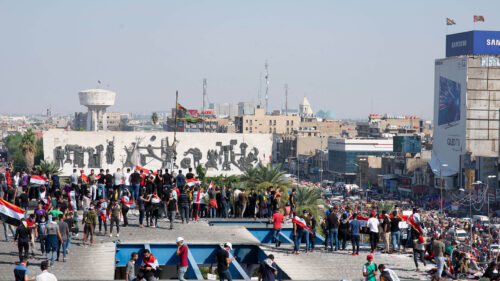Fifteen years ago, two representatives of an American charity were at work in the Persian Gulf; well beyond the regular menu for “development,” we helped a man named Hatem serve up joy to a benighted Arab city which had suffered for decades under Saddam Hussein and then more recently under the abuse of American contractors.
The following is an edited excerpt from David Holdridge’s book Avant Garde of Western Civ, Press Americana, 2017. David has recently published a new book, The Water Above, about the conflict between Israel and the PLO in 1982.
Al-Basra, 2009.
By the summer of 2009, Gaza (Operation Cast Lead) had been long gone from the headlines, and I had transferred the mop, so to speak, to the designated director (none other than my pal from Walla Walla). I had arranged it with my deputy Paul for me to fly into Basra and to see what I could do about standing up a proper operation of literacy and connectivity in the ruins of what had once been a magnificent source of hydrocarbons and their derivatives before Saddam had starved it half to death in 1991.
It had been a year since the Jaysh al-Mahdi (a militia led by Muqtada al-Sadr) had been defeated in Basra by the Iraqi army. Its fighters dispersed into the surrounding mud and wattle slums, licking their wounds, though still quite able and willing to drop occasional mortars down the tube toward the airport base, hoping to hasten the departure of the remaining British soldiers and assorted contractors. Meanwhile, Iran would fiddle for advantage, and the multinational oil companies would sniff around, both aware that capital would remain the coward until a modicum of law and order could allow Basra its place in the sun — with time eclipsing the other bejeweled pretenders like Qatar and Kuwait.
We were getting there late, replacing another American charity, which had taken flight a year earlier, and assuming many of its local staff. Unlike our other offices, we had never had the chance to live together with these nationals and fully bring them into our definition of “right relations.” For security reasons, we had promised not to cohabit in their existing office; rather, we met in a clandestine way as we sought to take them from bricks and mortar to transformative investments. To replace the engineers with social activists. To reinvent the operations in Basra.
So about Java: Dr. Javanshir from Baku with a medical degree from Moscow, to be precise, sat at dusk with me on this bench of sorts, really no more than a plank from a nearby scaffold put atop some cinder blocks, with our backs leaning against a chain link fence. We were not too far from a concrete bunker where, sometimes at the sirens call, we would need to rush. We were nursing some alcohol in a brown paper bag and trading stories on the war in Nagorno-Karabakh, where he, in his youth, had served as a medic on the front, until one fortuitous day, he had been picked up in the flush of national independence by a Western charity, then circulating freely within the former Soviet sphere, amply financed by the Peace Dividend from the recent rout of Russia in the Cold War. In fact, diving headfirst into that dividend, paying intellectuals like Java in big dollars to spread the gospel of Pluralism, Rule of Law and, above all, Freedom — not an unimportant advertisement, since Java seemed to my old eyes quite gay.
The Brits’ departure and contractors’ arrival
It was surely a buyers’ market for these intellectuals, with professors driving taxis and doctors bartering their skills for Marlboros. Thus, a straight track soon emerged for Java to Afghanistan with the same Western charities, but this time with the expat chevron on his sleeve. Not a full-fledged expat, mind you — he was more like an expat in waiting — toward that day, if ever, when he would have Western Civ. flowing unequivocally in his veins.
All of which had led him to be sitting there with me on the bench — just one short hop, skip and jump from Basra City, temporarily renting a container in the Brit perimeter around the airport so as to set up a back office until we could insinuate into the city along the Shatt al-Arab. A time of transition, it seemed, as the Brits were packing out and thinning ranks, ceding the airport security to the Iraqis and the surrounding base to “contractors.” And so Java and I waited to get badged and otherwise authenticated so that we could leave behind our beds and our computers in the containers and hitch our way to the airport from whence, sweet as you please, we could get to where the West was still being actively hunted.
Yes, thin as a pin with big bat ears, “un vrai sensitive.” It took but a little imagination, or alcohol, to see him rise off the bench as iridescent, tiptoeing across the deck of the baths in Baku. His mother now stricken with cancer in Moscow.
Java, of course, did not sit at the mess with the pneumatics, which is what we called all that pumped-up contractor flesh. In fact, we abhorred it, made jokes how it could deflate with just one quick cut of Java’s scalpel. No, we un-pneumatics got there early and sat in a far corner. We, with frequent gestures, used words as a spring from which to tumble — and they, over there, who, other than commands, disdained words or any derivative eloquence. Excepting, of course, a certain kind of eloquence surrounding root words like “cunt,” “fuck,” “under a truck” or “putting holes through Arabs.” “Perforating them,” they laughed. And yes, as a for-profit concern, they did once make us an offer to escort us into town for an outrageous price.
The only other brush we had with them was after dark, when the mortars came in, as Java and I were sitting side by side in the concrete shelter, knee-to-knee with contractors, seeing their grim faces off the coals of our smokes. It was at close encounters like that, knee-to-knee, that one could know what one was made of, and Java, who liked life enough in spurts but not so much as to dread its passing, had a very unaffected knee — until the very garbled announcement came from the megaphones that we could emerge. We returned to our bench or, depending on the hour, to our containers whose corrugated roof, I might add, could not stop a falling rock, much less a descending shell made in Iran.
Unveiling Basra’s potential
So, we waited to be processed. We fish in a barrel for the remnants of Jaysh al-Mahdi, with our heartfelt yearning for our original mentor, T. E. Lawrence, and the prospects of our future insinuation into the city growing in our minds by the day.
Enter Hatem al-Bachary, a notable from Basra known earlier to me as a remote recipient for some small funds for the propagation of Internet literacy. Now, with our container authorized by the Brits and our status as the so-called soft power of the US occupation in the right databases, we left the chain-link fence for the airport. One late afternoon, we watched Hatem swing up in his quite weathered car and beckon us in — wearing his trademark purple and orange barker‘s “get-up.” Picture him best under a marquis, boisterous, an assault to the eyes. Not anything suggestive, subtle or sublime.
He was now moving on from our partner for Internet training to his most current brush with death, an amusement park. Yes, Sir, Donald Duck and Mickey Mouse in this marshland where the enforcers of “no joy” lurked in every recess and where the Persian Ayatollahs were no more than a stone’s throw across the waterway. There stood Hatem, arms akimbo, who had visions of the great wealth at his doorstep should Basra be able to shed the war and give the Emirates a race for their money in pushing the liquid gold to the market.
Nothing dreary or backward about him: amusement parks on the banks of the Shatt al-Arab, a radio station with an arrangement for feeding the BBC. Breaking ground on a modern hotel, biding his time until the oil infrastructure could be reconstructed. A barker beyond belief for the progressive dream. More than I could have imagined with my comparatively modest attempts at transformation in South Central.
So he had secreted us into his driveway at dark and had bedding laid out for us and soft drinks and filter tips all arranged by invisible women. A bit unsure about the right way to receive such ragged representatives from the West, notwithstanding that he sensed we had loads of US government money somewhere up our sleeves.
Later that night, we all got filled up with steaming lamb and couscous heaped up before us in a dining room of blasphemous — if one was thinking of T. E. — Victorian kitsch, which, like his suit, was about 100 years behind the times and devoid of suggestive, subtle or sublime.
Basra’s transformation from fear to joy
We scooted out his back drive and meandered down some roads till we were confronted with Jaysh’s nightmare: a jangle of brightly colored pushcarts, pastel ice cream stands, little girls in sequined party dresses and cars jockeying for space near a rainbow arch. So under Hatem’s wing and within the cover of his entourage, Java and I, with keffiyehs pulled tight, were ushered down a path through strings of gay festoons. All the mechanized amusements, the bumper cars and twirling swings, the carousels and extravagant slippy slides and delighted parents with their wide-eyed screaming children toward a once removed table on the banks of the river, assuming our backs to it.
With an almost electric astonishment, amidst the general cacophony, for the glorious platform now before us and “the joint… oh my God… was jumping.” It had all happened so fast from curb to the table I hardly knew what hit me. I grabbed Hatem at the back of his barker’s neck and shook him. The band struck up “In the Midnight Hour”… all that joy on earth… uninhibited… with all the Motown moves and the floor in front of us was hopping with boys… stomping those boards in a riot … and then behind them were… God bless them, the girls frantically up and down from their chairs. They broke my heart with their yearning, hijabs flying every which way and dancing as much as a body could from the waist up, hands to the heavens in a swaying ode to joy: “We Shall Rock You.”
I stared at Java and Hatem and feared this man was magic. Walpurgis Night in the heavy air of the marshland with Persia twinkling in the distance. I mean, when seen against the jihadi so recently ready in this here city to meet their maker as martyrs for the destruction of joy, Hatem was readying himself for his maker in unabashed praise of joy — to include the money to be gleaned off those girls going wild in the stands. I was breathless.
I mean, “You can’t kill it. Can you, Java?” I asked.
“Not forever,” he said.
Well, the rest was what I did — meaning if I had a business card, it would read, “Insinuating in strange and hostile places.” So, “me and Java” got into a neighborhood — very discreet — into the house of Hatem’s friend. Not to be seen on the street — just a cleaner, a car and driver, and a cook, courtesy of Hatem. So that was how we saw Basra — hunkered down in the back, face to the window pane. And with time — random and far from our house — popping out to meet someone close to our cause, probable kin to Hatem — more Internet investment amusement parks being far too far beyond the pale for any donor.
And then to the ensuing job. Now that the inaugural was done, Java and I started a little pipeline. Ensuring the same process for the subsequent recruits. Some few days inside the razor wire with the pneumatics, then sliding into the neighborhood as advised, “slowly, slowly, quickly,” followed tentatively by up and down the street. And just like that, the new office in Basra slowly rose to the occasion, with the pneumatics back at base being an effective strainer of sorts as they fear-mongered what was lying in wait outside the chain-link fences. In so doing, it separated out those who would never be true to T. E. Most went through to Basra — excepting some American girls who ended quite too at home with the pneumatics. As it turned out, they never lived the South beyond the containers, but did, nonetheless, help with processing new folks in and out, as well as assuring us a reliable resupply of ink cartridges.
This, I concluded, was the best — with the likes of Hatem and Java, the Barker and the “Sensitive,” insinuating… my God… amusement parks. No one in the green zone would have believed it, could have fathomed such a tribute to Western Civ.
[Liam Roman edited this piece.]
The views expressed in this article are the author’s own and do not necessarily reflect Fair Observer’s editorial policy.
Support Fair Observer
We rely on your support for our independence, diversity and quality.
For more than 10 years, Fair Observer has been free, fair and independent. No billionaire owns us, no advertisers control us. We are a reader-supported nonprofit. Unlike many other publications, we keep our content free for readers regardless of where they live or whether they can afford to pay. We have no paywalls and no ads.
In the post-truth era of fake news, echo chambers and filter bubbles, we publish a plurality of perspectives from around the world. Anyone can publish with us, but everyone goes through a rigorous editorial process. So, you get fact-checked, well-reasoned content instead of noise.
We publish 2,500+ voices from 90+ countries. We also conduct education and training programs
on subjects ranging from digital media and journalism to writing and critical thinking. This
doesn’t come cheap. Servers, editors, trainers and web developers cost
money.
Please consider supporting us on a regular basis as a recurring donor or a
sustaining member.
Will you support FO’s journalism?
We rely on your support for our independence, diversity and quality.







Comment